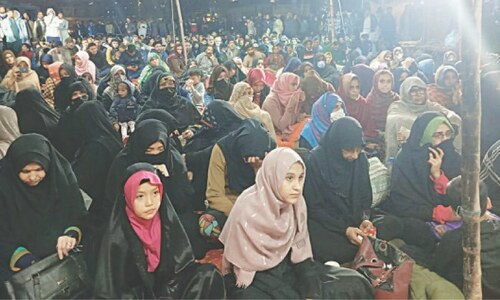KARACHI, Nov 5: Different events were organised in Karachi last year to celebrate the completion of the 22-volume Urdu Lughat (dictionary) with fanfare, claiming that 52 years of hard work had come to fruition.
Ever since its inception in 1958, the Urdu Dictionary Board has been headed by many noted individuals and has had to experience ups and downs, mostly the latter, primarily because of the lack of attention towards the board of the government-led institutions. No different is the situation today.
The Urdu Dictionary Board, these days, doesn't have a chief editor, and is being run by a certain official belonging to the National Language Authority (NLA) in Islamabad. Add to this the issue of the projects announced during poetess Fahmida Riaz's tenure as chief editor. The publishing of a concise dictionary, for example, has hit snags and doesn't seem to be heading in any direction.
The Drawing and Disbursing Officer at the Urdu Dictionary Board, Aqeel Siddiqi, has been associated with the board for many years. The current situation is clearly unsettling for him. Speaking to Dawn , he said: “Ever since Ms Riaz left after her two-year contract expired in June, things have been on a standstill. Till 2007 the board fell under the federal ministry of education. But after the passing of the 18th amendment, it was given to the cabinet division, following which the National Langrage Authority was asked to look after the affairs of the board. Now an official of the NLA, Sarfaraz Tariq, is the caretaker chief editor of the Urdu Dictionary Board.
“A lot of things have been held up. Our computer section has become non-functional; there's only one computer which is in working condition. On Oct 4, Mr Tariq came to Karachi for one day. He was here at the board offices for the whole day and signed a number of documents which were lying pending. Our staff is diminishing by the day. There haven't been any promotions for quite some time. We have no government support. There's no budget and things are on hold. Also, now they've made a ministry of heritage and integration and put institutions like the UDB and the NLA under it,” says Mr Siddiqi.
Ms Riaz says: “My two-year contract finished on June 18, 2011. I was expecting it to be renewed and thought it was a routine matter and I'd get an extension. When I was there, I tried my best to get the board on its feet. But I think it's a rule that no one above the age of 65 can get an extension. After the devolution process, the board went under the cabinet division and now they've formed the ministry of heritage and integration. You see, it's not easy to compile a dictionary. It doesn't take months, but years to do that. I feel that matters pertaining to academics should be free from the yoke of bureaucracy.”
There are people who might not agree with Ms Riaz. The bottom-line is the institution needs government attention.
Liaquat Ali Asim, who recently retired from a senior post at the board, says: “Before I left, updating of the Lughat had already begun. However, there are budget issues, there's not enough staff, funds are not forthcoming, etc. If the ministry concerned can decide when someone's tenure should end, it should also make arrangements for bringing in someone else in his/her place.”
A few years back, when a chief editor completed his term, the ministry advertised the post saying anyone who held a PhD, had experience in lexicography and was less than 55 years old could apply for the position. The only one candidate who applied and went through an interview in 2008 (and he believes he fulfilled all the requirements and got a good vibe during the question-answer session) wasn't entertained. Then the government changed and the board operated without a chief editor. In the meantime, Farhat Fatima Rizvi filled that gap and did her job well.
Today, the Urdu Dictionary Board is again without a chief editor. It's not exactly a headless body, but has a head which is far away (read: Islamabad) from the body.














































Dear visitor, the comments section is undergoing an overhaul and will return soon.